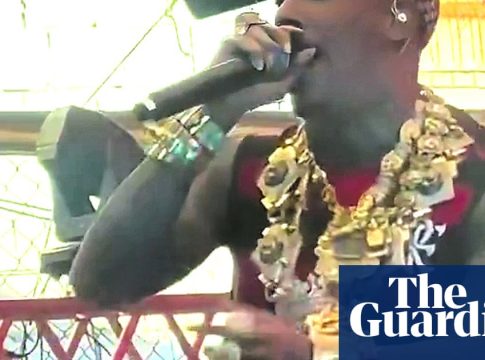Outrage Erupts Following Arrest of Brazilian Funk Star MC Poze Do Rodo
In a high-profile incident that has ignited public outrage, Brazilian funk artist MC Poze do Rodo was arrested early Thursday on charges of allegedly inciting crime through his music and purported ties to a notorious criminal organization. The 26-year-old singer, born Marlon Brendon Coelho Couto da Silva, was taken into custody at his luxury home in Rio de Janeiro’s west zone, drawing significant media attention and sparking fierce debates about race, art, and criminalization in Brazil.
Details of the Arrest
Authorities apprehended MC Poze, who boasts 5.8 million monthly listeners on Spotify, under controversial circumstances; he was detained while shirtless and barefoot, an event that has been widely publicized through television broadcasts and newspaper headlines. As he was transferred to jail, he adamantly proclaimed his innocence, declaring, “This is persecution against me. There is no evidence.”
Police officials justified the arrest by accusing MC Poze of glorifying drug trafficking and illegal firearm use in his lyrics. Rio’s police chief, Felipe Curi, stated that his lyrics posed a greater threat than a bullet fired by a drug trafficker. The police also alleged that his performances were sponsored by the Comando Vermelho (Red Command), one of Brazil’s primary criminal factions.
Community Backlash
The arrest has been met with a wave of condemnation from artists, intellectuals, and legal experts who argue that it reflects a broader trend of criminalizing funk music and Black culture in Brazil. This societal issue is rooted in historical contexts, dating back to the country’s abolition of slavery in 1888. Many funk artists, including MC Poze, hail from marginalized backgrounds and seek to portray the realities of life in favelas.
Prominent figures in the funk scene have taken to social media to express their solidarity with MC Poze. Fellow artist MC Cabelinho highlighted a disparity in treatment, questioning why actors portraying crime in films are not similarly branded as criminals.
Legal and Cultural Implications
Experts weigh in on the implications of this arrest. Pierpaolo Cruz Bottini, a criminal law professor at the University of São Paulo, argued that there is no incitement to crime in MC Poze’s music, suggesting that his work merely reflects realities that are widely recognized. He criticized the manner of the arrest as “completely inappropriate” and indicative of a systemic bias against funk culture.
Anthropologist Mylene Mizrahi noted that funk artists are often not taken seriously as legitimate creatives, unlike their counterparts in other genres. “When someone like Martin Scorsese makes a mafia film, they’re not branded mobsters,” she remarked.
The circumstances surrounding MC Poze’s arrest have opened a dialogue about the ongoing criminalization of Black cultural expressions and the need for a more nuanced understanding of art and its societal implications. The situation is developing, and further updates are expected as the legal process unfolds.
This story continues to evolve, and additional details will be reported as they become available.

Focuses on crime, public safety, and regional events.
Bio: Marcus is a community-based journalist passionate about reporting impactful stories that matter most to readers.

